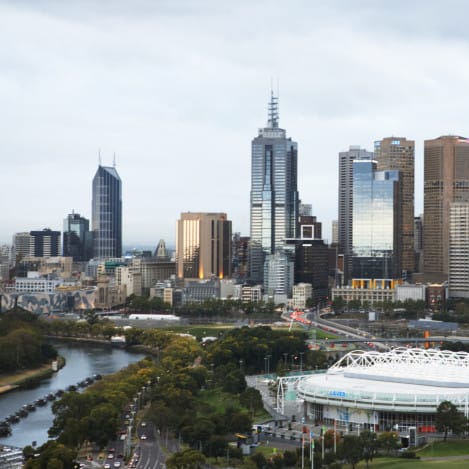Happy birthday, Melbourne – at 180, it's time for your history lesson
Melbourne has its 180th birthday today, but all that familiarity hasn't helped us know much about what this city was like before white settlement, historians say.


By CHRISTIANE BARRO
Melbourne has its 180th birthday today, but all that familiarity hasn't helped us know much about what this city was like before white settlement, historians say.
Melbourne was founded among wetlands and swamps, but most sign of them has long gone, said Associate Professor Rod Giblett, who held a Melbourne Day talk at the Royal Historical Society.
European settlement – marked from August 30, 1835, when settlers from Launceston on The Enterprize arrived on the banks of the Yarra River, at the place John Batman had designated as "the place for a village" – transformed the landscape and began the dispossession of the local Aboriginal people.
The wetlands were key factors in settlement, and shaped the development that followed, Prof Giblett said. They remain a defining feature of the city, in sites such as Albert Park Lake.
Royal Historical Society of Victoria past-president Dr Andrew Lemon said: “It is very instructive to go back and look at what the geography of Melbourne was like, which very much dictates the way Melbourne has been created physically.”
The CBD for example, is positioned near Queen St Bridge. Originally there was a rocky waterfall where fresh water met salt water. Logically enough, the settlement’s main port was sited near Queens Bridge, because of the direct access to fresh water.
“So it made sense to put the settlement of that place where there was fresh water, but also reminding us that there was a great swampy lagoon with a huge amount of wildlife, in the area where the Docklands are today,” Dr Lemon said.
Deakin University Australian and Pacific historian Dr Kirstie Close-Barry recalled the recent difficulty her students faced when trying to find information about these waterfalls, a key marker to where several significant landscapes of the town were constructed.
“It’s taken a lot of digging to find out that it was near where Queen's Bridge now is,” she said.
The lack of knowledge of Melbourne’s history, and how its geography shaped it, according to Dr Lemon, is damaging Melburnians' ability to make better and more informed decisions about its future.
“If we are going to change things, we need to know what it is that we’ve got, how it got there, and use that to think about making the best changes for the future,” he said.
Dr Lemon said the reason Melbourne had lost many of its “really good and interesting buildings” in the face of development was because “ we don’t care enough about some of the things that has made the city beautiful”.

The National Trust and the Heritage Council of Victoria have been actively working to preserve and protect historically significant areas and objects for future generations to experience.
Despite this, “some of the high-rise development in the CBD is out of scale and there is a very big risk of damaging some of the best parts of Melbourne”, Dr Lemon said.
There are also concerns that areas closer to the inner city – particularly South Melbourne and places such as Brighton and Fitzroy – are “losing their character” because of the redevelopment of older properties, he said.
Celebrating its status as the world’s most liveable city for the fifth year in a row, Melburnians, according Dr Close-Barry, “realise we have got it pretty good in Melbourne at the moment, mostly to do with the food and culture”.
Melbourne Day Committee executive officer Loretta Wylde said Melbourne was "multi-faceted, multi-talented and can be of value to all sorts of different personalities".
Despite this, Ms Wylde and Dr Close-Barry agree local need to have greater awareness of the city's history and thoroughly know what it means to be a Melburnian.
“A greater historical knowledge would only add to people's already strong appreciation, and develop a more complex recognition of how the city came to be," she said.
"The city's history is not entirely a happy one and I think that difficult past needs to be held beside the positive aspects of Melbourne's history to get a full understanding of where we've come from,” she said.
A number of concerts and other events are being held to celebrate Melbourne Day today. See details here.





